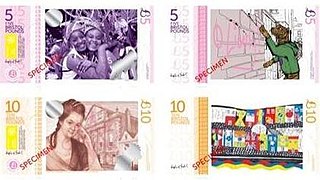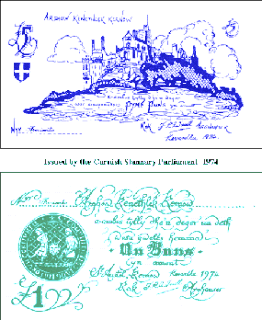 W
WThe Bristol Pound (£B) is a form of local, complementary, and/or community currency launched in Bristol, UK on 19 September 2012. Its objective is to encourage people to spend their money with local, independent businesses in Bristol, and for those businesses to in turn localise their own supply chains. At the point of the close of the digital scheme in August 2020, it was the largest alternative in the UK to official sterling currency, and is backed by sterling.
 W
WBrixton is a district in the south of London, England, within the London Borough of Lambeth. The area is identified in the London Plan as one of 35 major centres in Greater London. Brixton experienced a rapid rise in population during the 19th century as communications with central London improved.
 W
WThe Celtic currency of Britain were the various items and coins used as currency between approximately 200 BC and AD 60. The earliest currency consisted of various forms of iron bars. Coins were first imported in large numbers in around 150 BC and domestic minting began around 100BC. Coin production was largely ended by the Roman conquest of Britain, first by the Claudian invasion of AD 43 and later by the Defeat of Boudica in AD 60 or 61. Cast coins may have been produced for a few more years around Hengistbury Head. Exact dating of coins often changes in the light of new research.
 W
WCurrency, in the form of coins, has been issued in Cornwall periodically since at least the 10th century AD, while banknotes were issued into the 19th century.
 W
WThe Lewes Pound is a local currency in use in the town of Lewes, East Sussex. Inspired by the Totnes pound and BerkShare, the currency was introduced with the blessing of the town council in September 2008 by Transition Town Lewes as a community response to the challenges of climate change and peak oil.
 W
WThe United Kingdom was the first country in the world to issue postal orders on 1 January 1881. They were the brainchild of the president of the Birmingham Chamber of Commerce, John Skirrow Wright which was to enable poorer people to buy goods and services by post, as they were unlikely to have bank accounts. The rich had bank accounts and could write cheques. A delegation of the Birmingham Chamber went to the annual meeting of chambers of commerce in London and John Skirrow Wright presented the idea, complete with all the details on how it would work including all the postal order values proposed. At first London bankers were against the idea, thinking it would affect their businesses, and the idea was rejected. However, eventually, the bankers realised that the people who would use postal orders were not their customers and therefore no threat to their business. Consequently, at the Annual Meeting a year later John Skirrow Wright presented the idea again and this time it was accepted and the postal order system was started exactly as Skirrow Wright and Birmingham Chamber had proposed.
 W
WThe pound sterling, known in some contexts simply as the pound or sterling, is the official currency of the United Kingdom, Jersey, Guernsey, the Isle of Man, Gibraltar, South Georgia and the South Sandwich Islands, the British Antarctic Territory, and Tristan da Cunha. It is subdivided into 100 pence. The "pound sterling" is the oldest currency in continuous use. Some nations that do not use sterling also have currencies called the pound.
 W
WThe Royal Mint is a government-owned mint that produces coins for the United Kingdom. Operating under the legal name The Royal Mint Limited, the mint is a limited company that is wholly owned by Her Majesty's Treasury and is under an exclusive contract to supply all the nation's coinage. As well as minting circulating coins for use domestically and internationally, the mint also produces planchets, commemorative coins, various types of medals and precious metal bullion. The mint exports to an average of 60 countries a year, making up 70% of its total sales. Formed over 1,100 years ago, the mint was historically part of a series of mints that became centralised to produce coins for the Kingdom of England, all of Great Britain and eventually most of the British Empire. The original London mint from which the Royal Mint is the successor was established in 886 AD and operated within the Tower of London for approximately 800 years before moving to what is now called Royal Mint Court where it remained until the 1960s. As Britain followed the rest of the world in decimalising its currency, the Mint moved from London to a new 38 acres (15 ha) plant in Llantrisant, Glamorgan, Wales, where it has remained since.
 W
WThe Great Debasement (1544–1551) was a currency debasement policy introduced in 1544 England under the order of Henry VIII which saw the amount of precious metal in gold and silver coins reduced and in some cases replaced entirely with cheaper base metals such as copper. Overspending by Henry VIII to pay for his lavish lifestyle and to fund foreign wars with France and Scotland are cited as reasons for the policy's introduction. The main aim of the policy was to increase revenue for the Crown at the cost of taxpayers through savings in currency production with less bullion being required to mint new coins. During debasement gold standards dropped from the previous standard of 23 karat to as low as 20 karat while silver was reduced from 92.5% sterling silver to just 25%. Revoked in 1551 by Edward VI, the policy's economic effects continued for many years until 1560 when all debased currency was removed from circulation.